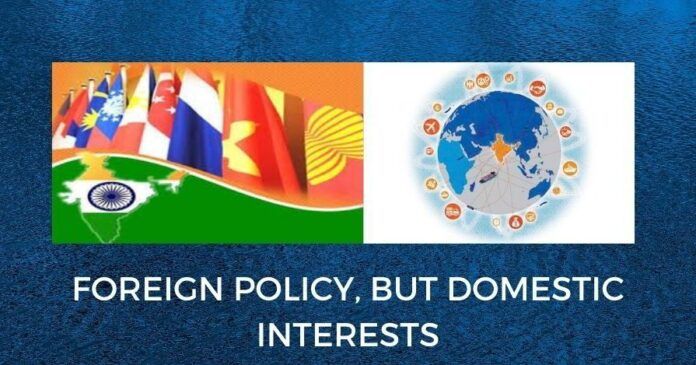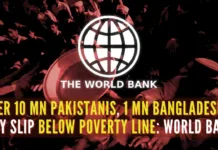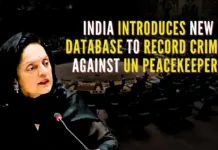
There is also a fifth element — besides history, geography, capability and leadership — essential to understanding the shaping of India’s foreign policy. It is the mistakes and blunders that were committed along the way
There is no one definition of foreign policy, but most agree on two essential elements that comprise, or should comprise, such policy of a nation. The first is that it ought to be grounded in reality. And the second is that it must, above everything else, take care of the country’s national interests. Various studies on foreign policy have proposed several theories to explain why nations adopt a particular diplomatic measure or an overarching strategy. These theoretical exercises have concluded that ideas and ideals of realism, economic structuralism, liberalism and individualism have profoundly impacted foreign policy documents.
There is classical realism, best exemplified by Chanakya and Machiavelli, which claims that interests are best determined in terms of power. Machiavelli’s famous quote that ‘it is safer to be feared than loved’, may not sound politically correct in the contemporary era, but the fact remains that strong nations have always held the levers of decision-making on the global stage based more on fear than love. China is a good example; few countries can claim genuine affection for it, but given its economic and geostrategic might — and despite its regular belligerence over matters of dominance — most of them do business, both diplomatic and economic, with Beijing.
Economic structuralism may not have had the strength to challenge the free-market wave across the world following the war’s end, but it did manage to survive in pockets — China, Soviet Russia, Vietnam and Cuba, to name a few
‘Realists are sceptical of the idea that universal moral principles exist, and therefore warn state leaders against sacrificing their own self-interests in order to adhere to some indeterminate notion of ethical conduct… Realists argue that the need for survival requires “state leaders to distance themselves from traditional notions of morality”[1]. The acquisition of power thus becomes important. But power, even if enormous, in itself is meaningless, according to realists, unless it is used to further a country’s core foreign policy interests.
Realism’s repeated emphasis on the accumulation of power and its use is best understood by recalling the context in which the realist emerged. Realism gained acceptance following the weakening of idealism — a strand of thought that had acquired dramatic currency in international relations but had equally dramatically collapsed with the breakout of the Second World War. In the so-called Great Debate that raged across the world among scholars, the realists got the better of the idealists who were busy understanding the cause of the war and formulating means to avoid a repeat. Followers of realism pushed home three primary arguments: One, that idealists had failed to appreciate the role power can play in world diplomacy; two, the idealists had over-estimated the influence that shared-interests of nations could have in averting conflicts; and three, misplaced optimism over the prevalence of peace (thus resulting in lowering of the guard) can actually result in the outbreak of war.
The second theory that explains strands of foreign policy is economic structuralism. It is a euphemism for a Marxist world order, which highlights the imbalance between capitalist nations and economically fragile countries. It argues that international relations assume a lopsided shape, with the balance of power tilting towards the capitalists and leaving the economically weaker countries with a foreign policy that is not truly designed to protect their real national interests. Soviet Russia’s Vladimir Lenin pushed this theory on the global stage when he said that rich nations dumped their excess goods in weaker countries, thus driving down prices and sending the domestic economy of the target nation into a tailspin. This made the suffering nation even more dependent on others for survival, and its foreign policy, therefore, reflected a high level of subjugation.
The end of the Cold War and a greater global acceptance of the ‘free market’ capitalist order presented a major challenge to the Marxist system. Most experts assumed that Marx would now find a place in the dustbin of history. That did not happen. Economic structuralism may not have had the strength to challenge the free-market wave across the world following the war’s end, but it did manage to survive in pockets — China, Soviet Russia, Vietnam and Cuba, to name a few. In present times, although considerably weakened, the Marxist concept still exists, though it has been tweaked by communist regimes to suit their immediate and future needs. Simply put, the Marxist international outlook holds the belief that everything, from wars to treaties to aid-offering institutions, functions within frameworks designed to influence, in a one-sided manner, the outcomes of these events. For Marx and his followers, so long as international diplomacy was conducted on the basis of the existing inequality between the economically empowered and the economically weak, and between the capitalist and the working class, there cannot be an enduring global peace and prosperity.
In India’s case, powerful empires emerged from within, shaping the national psyche with their brand of international relations, both political and economic.
The third explanatory theory rests on liberalism, which emerged as a strong alternative to realism. “Although realism is regarded as a dominant theory of international relations, liberalism has a strong claim to being the historic alternative. In the 20th century, liberal thinking influenced policy-making elites and public opinion in a number of Western states after the first World War, an era often referred to in academic international relations as idealism”[2]. The essence of liberalism is that international relations can best flourish in a climate of self-restraint, compromise and moderation. In other words, liberalism rejects realism for the latter’s emphasis on confrontation and dominance as ways to enhance foreign policy goals. Given that foreign policy goals of various countries often tend to clash because of the differing and conflicting priorities, a section of liberals has rooted for stronger international institutions that can play important roles in resolving such conflicts. But another group of liberals has been uncomfortable with international interventionist approaches — primarily because it is another form of intervention by the powerful countries — arguing that such an eventually would not arise if nations adhered to cooperation, moderation and non-confrontation in their foreign policy outlook.
Various other theories have been floated from time to time to assist in understanding international relations, and they have all contributed to the depth on the subject. Like other countries, India too has been influenced by them in varying degrees at different points in time. New Delhi flirted with idealism for a while during Jawaharlal Nehru’s time and burnt its fingers. It adopted realism after Indira Gandhi firmly established herself as the Congress party’s leader and the country’s Prime Minister. Realism gained centre-stage with the integration of Sikkim in the Indian Union, and the bifurcation of Pakistan following the 1971 war — both during Indira Gandhi’s tenure. That was political realism; economic realism would come two decades later, with the reforms of 1991. Until then, Indian governments and their foreign policy initiatives were in large measure rooted in the communist-socialist economic mindset. But so strong has been New Delhi’s adoption — albeit late — of an overarching realism, that the theory continues to drive our foreign policy thinking to this date, though there have been occasional slippages.
Theories apart, international diplomacy is moulded primarily by certain existential aspects. “The foreign policy of any country is shaped, powered and constrained by three major factors: history, geography and capability. To these, we add leadership (both its presence and force, but also at times its absence)”[3]. In India’s case, powerful empires emerged from within, shaping the national psyche with their brand of international relations, both political and economic. There were also empires that were constructed by rulers who came to India from foreign shores. Foreign raiders arrived and looted and plundered the country, perpetuating atrocities of the worst kind in the process on its people. India also fell to colonial rule and after many decades of persistent struggle, gained independence. These are all matters of history, and the experiences impacted free India’s foreign policy outlook from time to time. For instance, the colonial rule left behind deep suspicions in the minds of Indian leaders about Western designs and led Nehru to gravitate towards the Soviets and a state-driven economy that could usher in self-sufficiency and cut down on Western imports.
In the early years of its independence, India was too occupied with the aftermath of the Cold War and its obsession for non-alignment to reach out to its Asian neighbours in meaningful ways
The history of British rule threw other foreign policy challenges that India continues to grapple with even today; partition, for example. “While India adopted and emphasized a secular identity, Pakistan emphasized its Islamic one, creating diplomatic challenges for India with other Islamic countries, which for many years reflexively supported Pakistan in votes at the United Nations and elsewhere at times of disputes with India — although much less today”[4].
Geography plays a key role in shaping the foreign policy of a country, and India is no exception. While its peninsular status, and the formidable Himalayan peaks in the north, do offer it some respite from hostile forces, the age of hi-tech and proxy warfare using terrorists cancel out those advantages. The positive part is that, given its geographical location, India can influence the regional narrative in international relations. It may not have used it as an effective tool in the past many decades of independence, but over the years that has changed. New Delhi has forged ties with South Asian and South-East Asian nations, spreading its area of influence right up to the Central Asian Republics.
On the other hand, India’s foreign policy in the neighbourhood and the near neighbourhood has been beset with crises of various kinds. Despite geography giving ample reasons to maintain cordiality and reap the rewards, India has had many ups and downs with neighbours such as Nepal, Bangladesh and Sri Lanka — besides, of course, Pakistan. In the early years of its independence, India was too occupied with the aftermath of the Cold War and its obsession for non-alignment to reach out to its Asian neighbours in meaningful ways. Ironically, it also simultaneously dreamt of being an Asian power.
India’s desire to be an Asian power was, unfortunately, not matched by its capability in the initial decades of freedom. Its economy was weak and the Indian diaspora was too scattered and disorganised to effectively influence the attitudes of foreign powers in New Delhi’s favour. The lack of its defence preparedness was exposed in the conflict with China in 1962, though there was redemption in the 1965 and the 1971 wars with Pakistan. The coming years would witness India’s defence capabilities improve. Nehru’s and Indira Gandhi’s public sector driven model had dragged down the country’s economic potential and left it with little leverage to attract foreign investment and consequent global influence. It is not a coincidence that the reforms of 1991 triggered a turnaround in the country’s international standing, and with subsequent governments building on that foundation, New Delhi has come to acquire a formidable stature globally.
History, and to extent geography are constants; what changes regularly, especially in a democratic system such as that of India, is leadership. Nehru’s instinctive faith in idealism, though commendable, brought little on the table for India. He must, however, be given the credit for nurturing democratic institutions that became pillars of strength for the country in subsequent decades. He did have a place of his own on the world stage; just like his daughter and later Prime Minister Indira Gandhi would, but for different reasons. Atal Bihari Vajpayee and Manmohan Singh too, in their own different ways, sought to consolidate New Delhi’s stature internationally — a task that continued with increased vigour under Narendra Modi’s prime ministership. One common factor throughout the governments led by PV Narasimha Rao and presently has been the role played by India’s growing economic clout.
There is also a fifth element — besides history, geography, capability and leadership — essential to understanding the shaping of India’s foreign policy. It is the mistakes and blunders that were committed along the way. Most countries have a fair share of these and India is no exception. This book, while keeping the four factors on its radar, takes a closer look at the fifth. The idea is not to create villains out of our leaders by apportioning blame but to understand and realise that those errors cost the country, in some cases so dearly that we still continue to bear the burdens of lost opportunities and flawed decisions.
The faux pas encompassed a variety of areas, from political to economic, and was driven by leaders either deeply enmeshed in their pet ideologies or misled by circumstances or overly trustworthy of others; often the blunders happened by a combination of two or all of these. Whether it was approaching the United Nations on the Kashmir issue or ceasing operations just when the Indian forces were on the verge of driving out the Pakistan troops from what is now Pakistan-occupied Kashmir, or blindly humouring the Chinese or the botched-up Agra summit between Prime Minister Vajpayee and Pakistani President General Pervez Musharraf, the examples are many. The clock cannot be turned back, but we can and must avoid a repeat.
References
[1] The Globalization of World Politics: An Introduction to World Politics, Edited by John Baylis, Steve Smith, Patrician Owens, Oxford University Press – 2014
[2] The Globalization of World Politics: An Introduction to World Politics, Edited by John Baylis, Steve Smith, Patrician Owens, Oxford University Press – 2014
[3] The Oxford Handbook of Indian Foreign Policy, Edited by David M Malone, C Raja Mohan, Srinath Raghavan, Oxford University Press, – 2015
[4] The Oxford Handbook of Indian Foreign Policy, Edited by David M Malone, C Raja Mohan, Srinath Raghavan, Oxford University Press, – 2015
Note:
1. Text in Blue points to additional data on the topic.
2. The views expressed here are those of the author and do not necessarily represent or reflect the views of PGurus.











Foreign policy, but domestic interests. Rajesh Singh Ji, one of the best write ups in Pgurus.
Its true that the history of British rule threw other foreign policy challenges that India continues to grapple with even today.Most of our foreign trade polices dates back to Brits time!
We witnessed Simla Apples and Mangos policies under personal whims and fancies.
There is no point is blaming this or that PM.
Our foreign policy on Islamic Pakistan in-spite of its cross boarder terrorism, drugs, hawala etc still most of our Govts since independence categorized Pakistan as the “most favored nation”!! Dr.S.Swamy reminded the PM Modi Govt on this!!!!!!!!!!!!!!!!!!!!! A cruel joke on us on Pakistan Status!! Dr.Swamy has to remind the incumbent Govt of the day!!
India must be lead by Nationalists educated men and women not people like servile educated Dr.Man Mohan Singh. He was an intellectually dishonest.